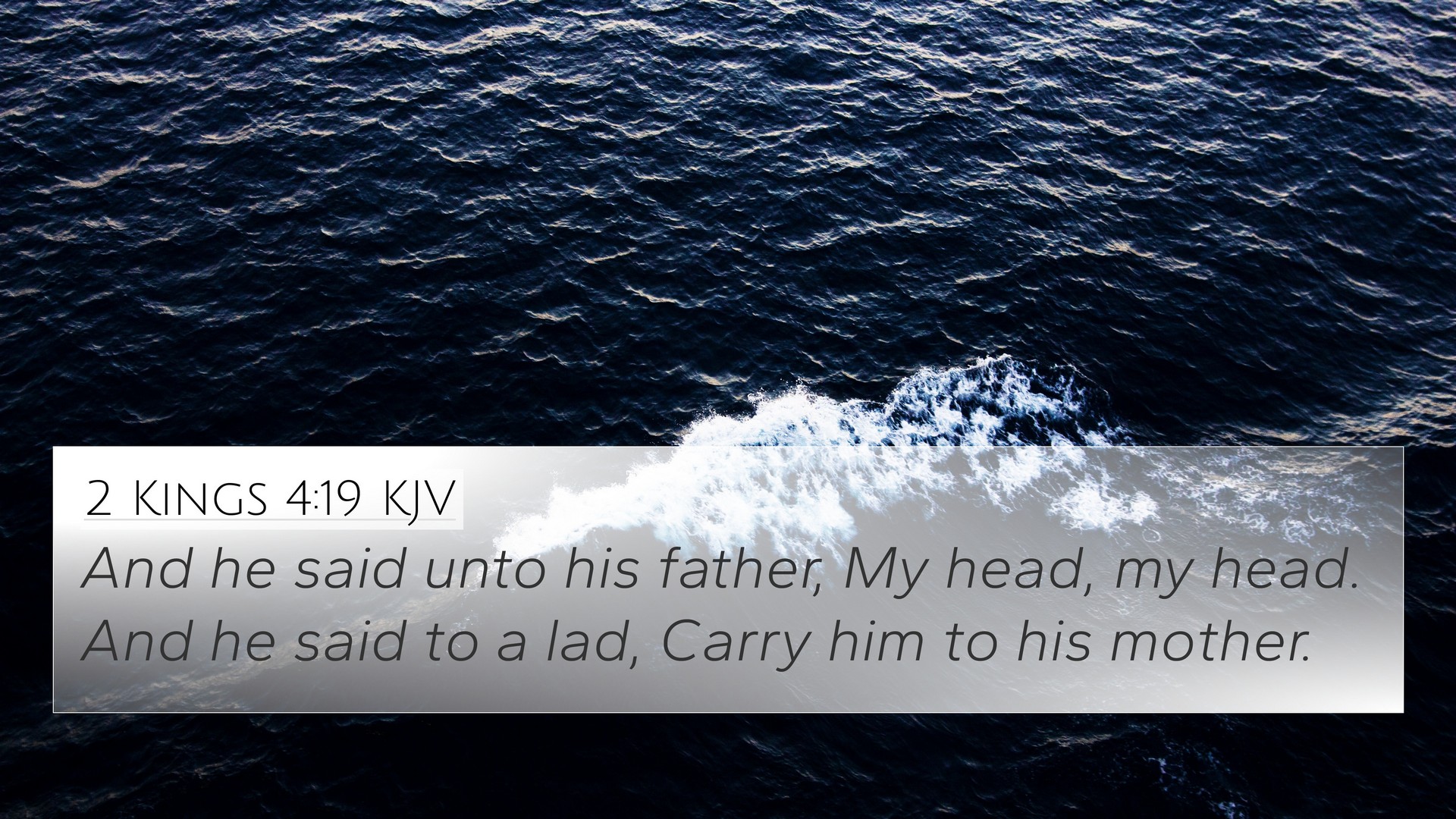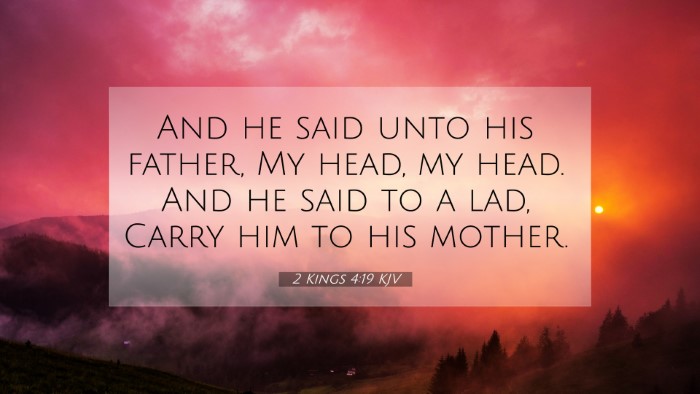Understanding 2 Kings 4:19
Bible Verse: 2 Kings 4:19
In this verse, we read about a distressing moment for the prophet Elisha and the Shunammite woman. The verse states, "And he said unto his father, My head, my head. And he said to his father, Carry him to his mother." This situation encapsulates the themes of anguish, parental care, and the reliance on faith during times of crisis.
Summarized Meaning
This narrative demonstrates the immediacy of a child's distress and the active role of parents in seeking help. As observed in various public domain commentaries:
- Matthew Henry: Henry elaborates on the emotional state of the child and how he could not articulate his suffering fully. He points to the mother's pivotal role in navigating this crisis, exemplifying maternal intuition and care.
- Albert Barnes: Barnes highlights that the physical ailment of the child may symbolize a broader spiritual distress, reinforcing the connection between physical and spiritual healing. He notes the significance of the mother’s response—quickly taking charge and seeking Elisha's intervention.
- Adam Clarke: Clarke discusses the cultural context of parental roles, indicating how the societal expectations of men and women play a part in the dynamics of caregiving and crisis management. He emphasizes the compassion and urgency that guide the mother to respond swiftly to her child's plight.
Connections to Other Bible Verses
To deepen our understanding of 2 Kings 4:19, we can explore related scriptures that highlight similar themes of distress and divine intervention:
- 1 Kings 17:21-22: Elijah raises the widow's son, paralleling Elisha’s actions and God's power over life and death.
- Mark 5:23: Jairus insists that Jesus come to heal his daughter, illustrating the urgent concern parents have for their children.
- Matthew 15:22-28: The Canaanite woman pleads for her daughter’s healing, emphasizing persistent faith in times of trouble.
- John 11:35: Jesus weeps at Lazarus’ grave, showing His empathy during moments of sorrow.
- Luke 8:51: Jesus enters the house of Jairus, only to be met with despair, yet He brings hope through His miraculous power.
- James 5:15: The prayer of faith will save the sick, emphasizing the role of prayer in times of crisis.
- Psalm 34:18: "The Lord is near to the brokenhearted," reminding us of God’s closeness in our moments of pain.
Thematic Bible Verse Connections
The exploration of 2 Kings 4:19 reveals several themes that resonate throughout the Bible:
- The Role of Mothers: The nurturing and protective nature of mothers is highlighted in various scriptures, illustrating a God-given role to guide and care for the young.
- Faith in Crisis: Many narratives focus on responding to crises with faith, urging us to seek divine help in distressing circumstances.
- Intervention and Healing: Biblical accounts of miraculous healings reinforce the power of God to intervene in physical ailments.
- Emotional Distress: Many characters in the Bible exhibit emotional turmoil, prompting divine intervention, reflecting the deep human experience of pain.
Cross-Referencing Biblical Texts
For those studying the Bible, using tools for Bible cross-referencing can help uncover rich connections:
- Utilize a Bible concordance to identify recurring themes and related passages that address sorrow, healing, and faith.
- Engage in Bible cross-reference guide resources to find parallels between Old and New Testament narratives.
- Implement cross-reference Bible study to deepen understanding of how individual verses interrelate.
- Explore comprehensive Bible cross-reference materials that provide insights into the connections between various books and chapters.
Conclusion
2 Kings 4:19 is a compelling reminder of parental love and the urgent call for help in times of great distress. Through cross-referencing other scriptures and considering the insights of Matthew Henry, Albert Barnes, and Adam Clarke, we can appreciate the broader tapestry of God’s interaction with humanity—a theme vibrant throughout the entirety of the Bible.




